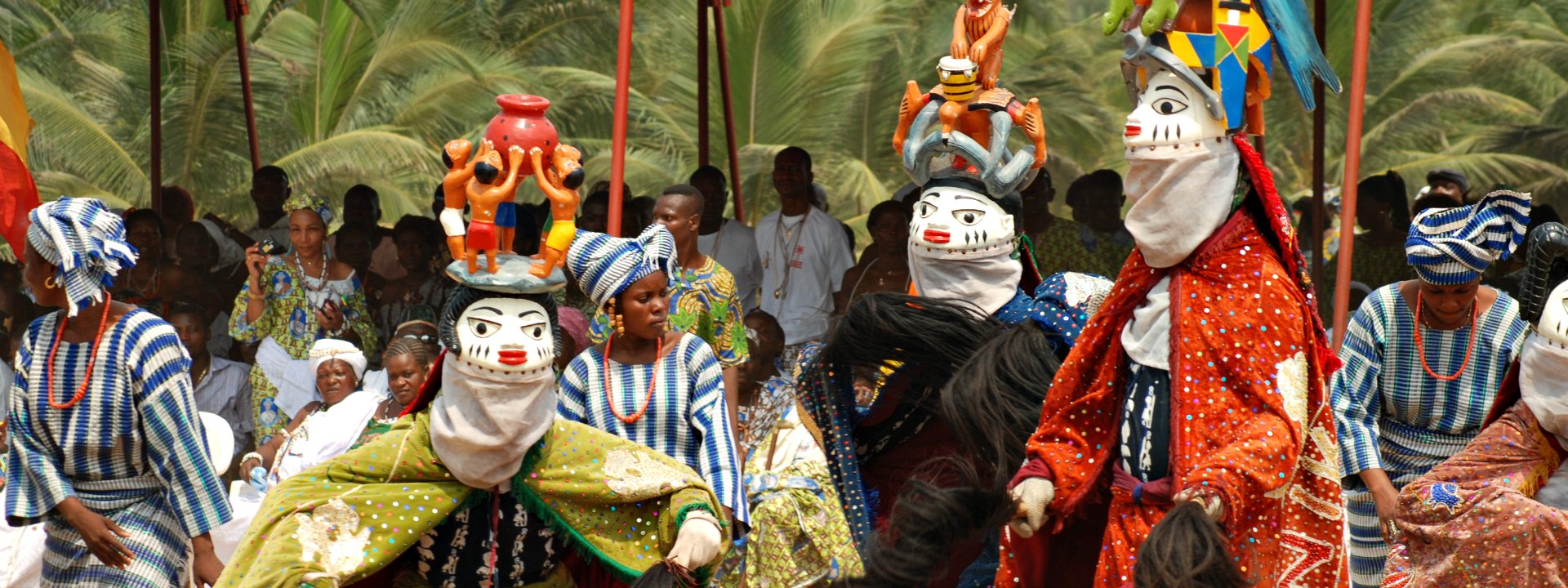
From giving thanks to warding off evil spirits or marking a rite of passage, festivals are a way to unite villages and communities throughout the world. Based on our long experience and travels here, we think the continent hosts some of the most spectacular, particularly those in Central and Western Africa.
It’s here, where there are far fewer tourists and where countries are far less modernised and westernised than other African counterparts in the East or South, that traditions are still deeply entrenched and followed, giving a more authentic and more intact cultural encounter.
For the traveller willing to go further of the beaten track than most, you’ll be rewarded by an intimate and unforgettable experience, where we are invited to respectfully witness and share what is undoubtedly the highlight of the community calendar.
Travelling through Ghana, the Ivory Coast, Benin, Cameroon, Gabon and Chad, here’s what we think are some of the most fascinating and exciting ceremonies and festivals in Africa.
Native Eye’s recommended Festivals in Africa
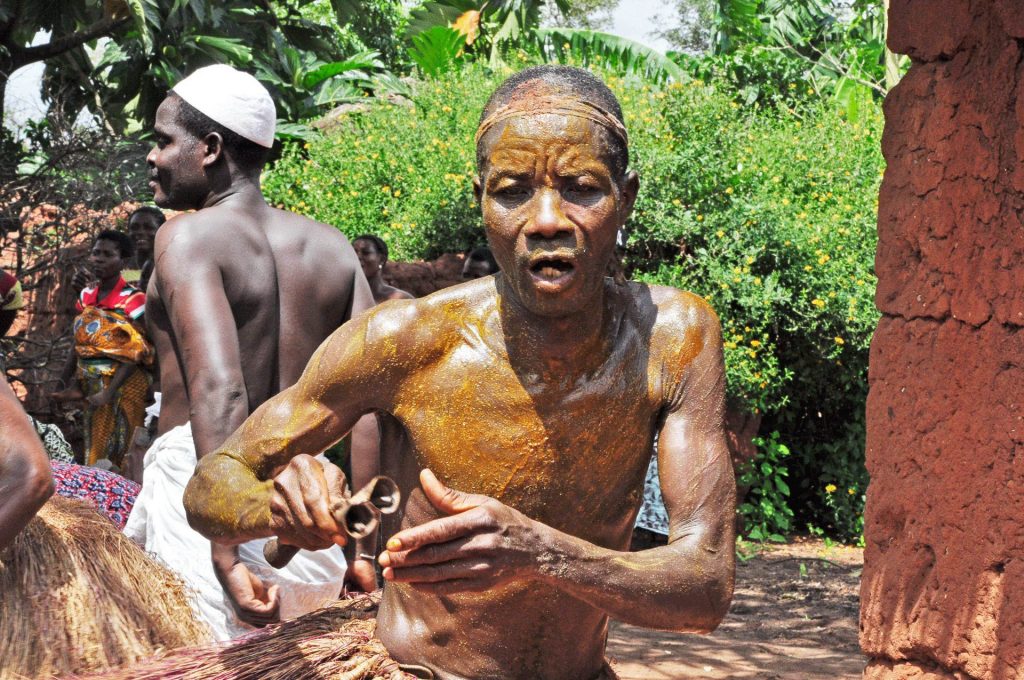
What? Ouidah Voodoo Festival, Benin
When? January
Forget what you’ve seen on television about Voodoo being a black art. For the people of Benin, it has the legitimacy of any other belief system, hence its status as their official religion. In essence, voodoo is the belief that everything is spirit, including humans.
The annual voodoo festival held in Ouidah, a small town and former slave port, must be amongst the most dramatic and fascinating celebrations on the planet, an easy shoo-in to qualify for a ‘best cultural festival in the world’.
A national holiday, the gathering includes traditional dance and animal sacrifices at shrines with some devotees, usually covered in white powder and palm oil, entering trance states. In the last two days of the festival, devotees offer dances to the spirits, sometimes organised dances, at other times, it seems as though they are running amok through the audience. Ritual sacrifice is part of the ceremony but not all of it, and amongst the dancing and celebration, it’s hard not to be caught up in the energy, theatre and devotion.
How:
Find out more about the Ouidah Voodoo Festival.
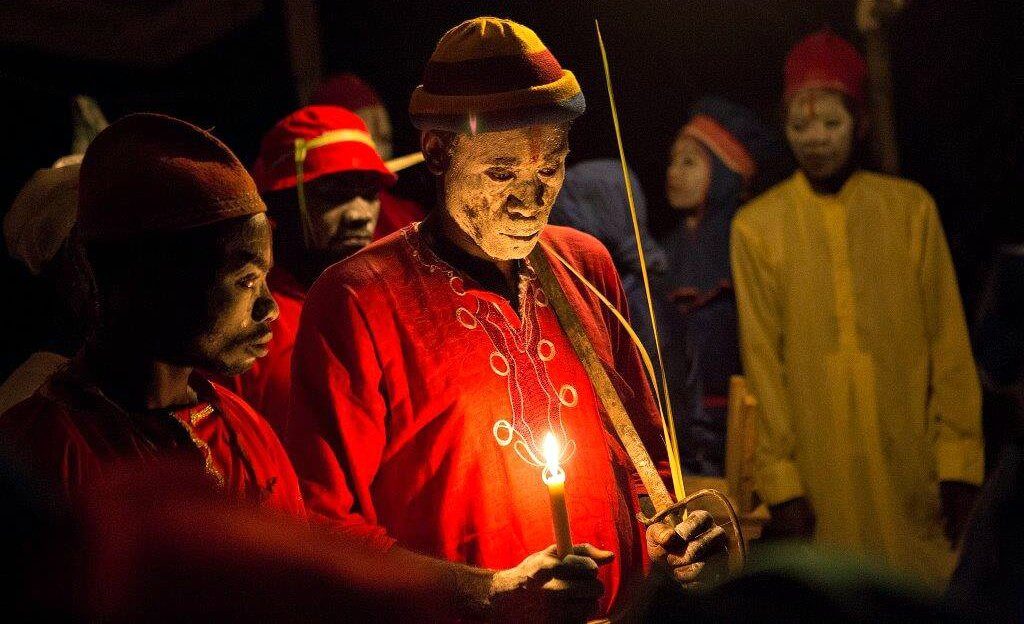
What? Bwiti Ceremony, Cameroon
When? March
We admit that this is more a traditional ceremony than a festival, although the atmosphere and frenzied vibe of the Bwiti ritual can make it feel like one to those lucky enough to witness it.
Arguably one of the most spectacular of all traditional ceremonies in Africa, the Bwiti (translated as ‘School of Life’) is a unique series of rituals where the whole Fang village, small children included, turns out in red and white robes with their faces painted. After ingesting the psychoactive iboga root, they are able to communicate with the spirits of the forest and, in doing so, able to find solutions to problems affecting the community or individuals within it. It’s very much a learning experience for everyone taking part.
The whole night of the ritual is spent drumming, dancing and chanting and we spend two nights here to fully appreciate the experience.
Similar Bwiti rituals, which have been practiced by Central African tribes for thousands of years, are also undertaken by other tribal groups nearby in the areas bordering Gabon and Equatorial Guinea.
How?
You can experience the Bwiti ritual on our 13-day Rhythms of Central Africa trip
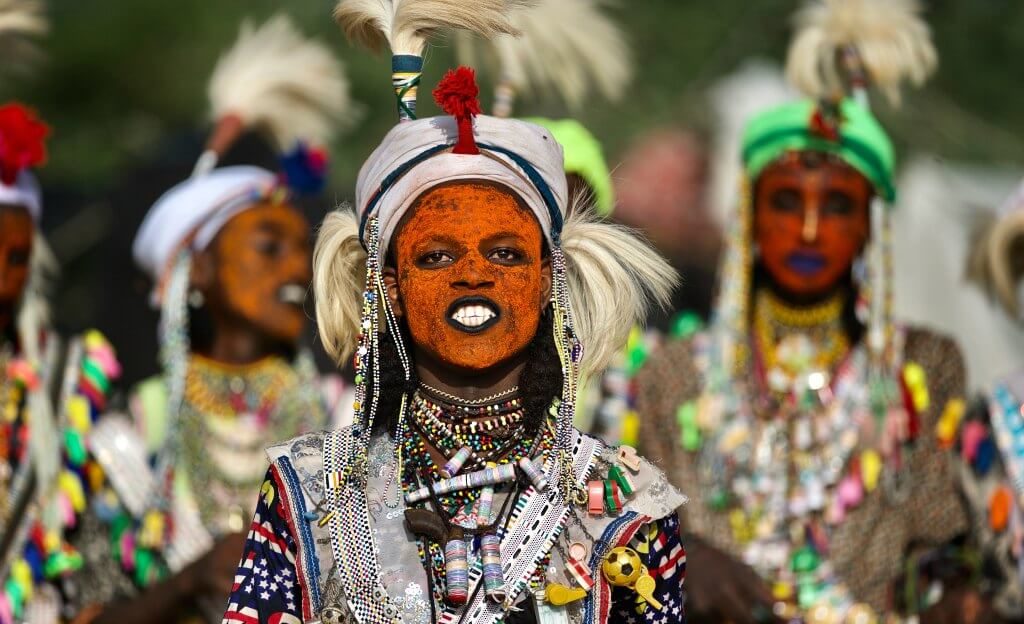
What? The Gerewol Festival, Chad
When? October
If we had to choose a favourite when it comes to the most colourful festival in Africa, we think this would take top billing. As a regular recipient of our newsletter and/or Facebook page, we’re sure that you are well-acquainted with our annual departures to the Gerewol Festival, Chad.
A spectacle of colour and dance, this event is essentially a dating festival, where men compete for the attention of eligible females in the community. Do have a look at photojournalist, Tariq Zaidi’s account in Adventure.com’s newsletter, There’s no Tinder in the desert article or Mark Stratton’s Awed of the Dance article in Wanderlust magazine, both of whom travelled with us to experience the festival for themselves. And don’t miss our Gerewol Festival in Photos blog.
How?
Join us on our Gerewol Festival trip or our Gerewol and Ennedi Mountains tour.
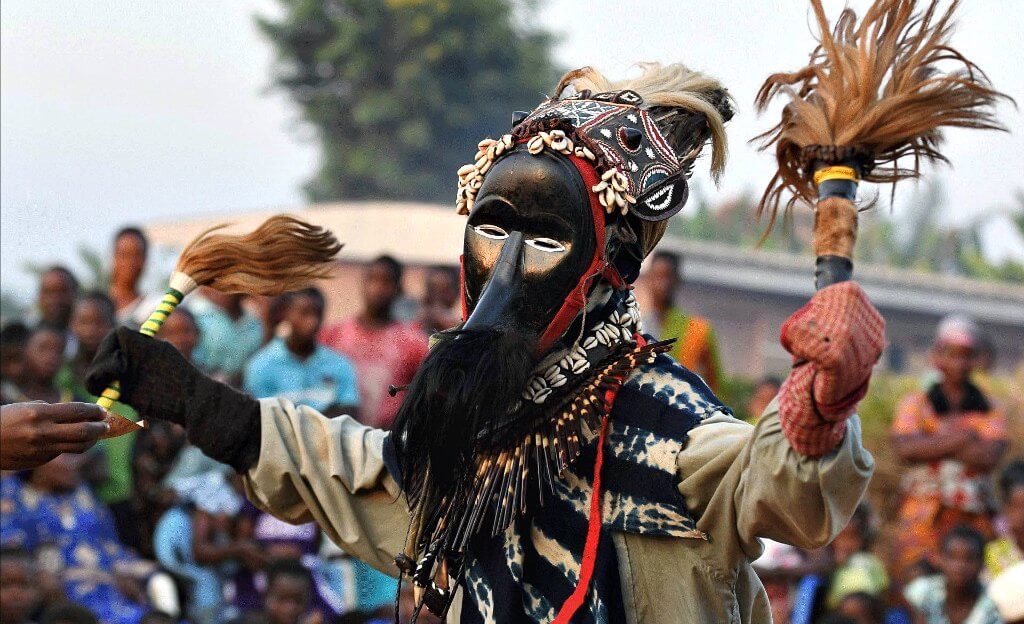
What? The Zaouli Masked Dances, Ivory Coast
When? During celebrations and funerals
Often performed at celebrations and funerals of the Guro communities, the Zaouli mask dance is one of the most intriguing and unusual festivals in Africa. Having only been performed since the 1950s, the dance was inspired by a young Guro girl, Djela Lou Zaolui (the Lion‘s Daughter), and is widely regarded as a homage to feminine beauty.
Today, the dance is only ever performed by men and takes up to seven years to perfect by each Zaouli dancer. On donning the mask, the dancer keeps his body completely still whilst his legs dance, with no two moves the same.
As well as the mask, the dancer will also wear a striped, locally made bodysuit, with raffia wrist and ankle bands, bells and seed pods adding to the cacophony as he moves. The dancer is accompanied by wild drumming as well as flute or horn playing.
It’s a spectacle to watch as the dancer whips the audience into a frenzy!
How?
Whilst these performances occur only during celebrations and funerals, such events are commonplace as you travel through the Ivory Coast on our Ancient Gods of West Africa trip.
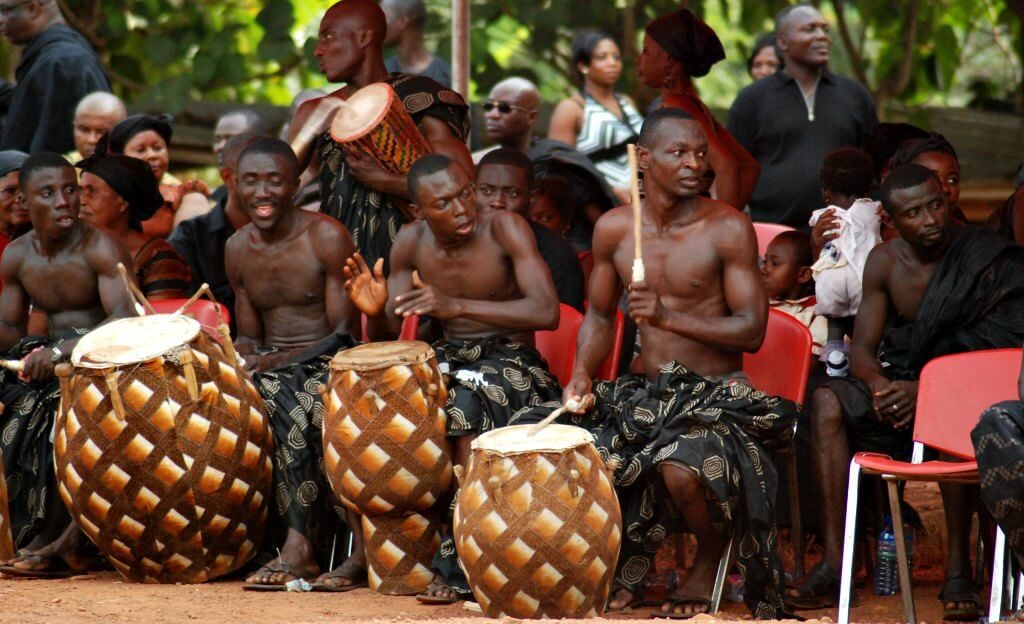
What? Ashanti Funeral, Ghana
When? Most weeks
A flamboyant and elaborate celebration of life makes this a ‘best festival in Africa’ contender, and you’re highly likely to come across an Ashanti funeral when travelling through Ghana, given that a large proportion of the country’s population belongs to the tribe. Such events, whilst inevitably tinged with sadness bring out the entire community (it’s not uncommon for hundreds of people to attend) as they gather to bid farewell to a loved one.
Once the burial has been completed, the celebrations begin in earnest. You may be surprised that, given the circumstances, outsiders are welcome to respectably witness proceedings, where red and black-clad mourners perform dances to the beat of the drum, and feast, all observed by Ashanti chiefs who look on under huge, decorated umbrellas.
How?
Take a look at our Gold and Magic tour, a journey through Ghana, Togo and Benin.
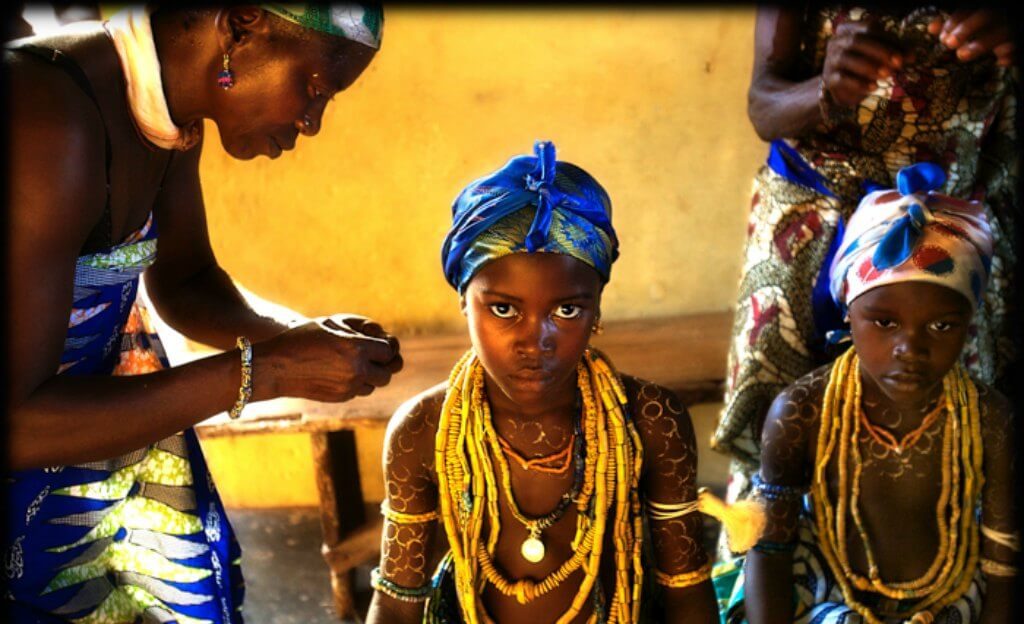
What? Dipo Initiation Ceremony, Ghana
When? April
After the child naming ceremony, puberty rites are the next set of rituals of social status transformation which children undergo in Ghanaian culture. Undertaken by the Krobo ethnic group and the Bragoro of the Ashanti, the Dipo Initiation ceremony, performed every April, marks the transition from childhood to womanhood. Once a girl has begun menstruation and following a period of two and three weeks of seclusion under the supervision of the matriarch of the town or village, the women emerge, newly knowledgeable about what being a woman and a good wife entails.
During this important rite of passage, a durbar is held, attended by the chief and almost everyone in the community. Here, the newly initiated women, heads shaven and clad in beautiful African beads, perform, dancing to the drumbeat in front of young men of marriageable age, a ritual carried out with the spirits and departed ancestors invoked to bless the participants, ensuring their protection, blessing and fertility during future motherhood. As fascinating as the Dipo initiation ceremony is for spectators and participants alike, they serve an essential function – no woman is allowed to marry without first having gone through them.
How?
See this celebration for yourself on our Festivals of Ghana trip.
Experience an incredible festival in Africa for yourself
If you would like more information about any of our festivals in Africa or elsewhere, we’d love to hear from you. Call Native Eye on 01473 328 546 or e-mail us using our contact page.
Other blog posts you might be interested in include:
Central Africa tours
20 Best UNESCO World Heritage Sites
West Africa holidays for first-timers
Best small group tours
Best places to visit in Saudi Arabia
Five of the best epic journeys
Remote travel destinations – top trips


